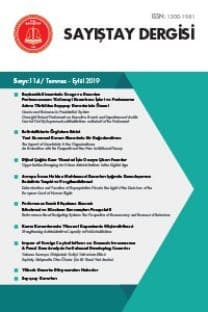MALİ ŞEFFAFLIK VE KAMU MALİ İSTATİSTİKLERİ AÇISINDAN KOŞULLU YÜKÜMLÜLÜKLERE BAKIŞ
Koşullu yükümlülükler, zamanlaması ve miktarı önceden belli olmayan ve devlet bütçesine mali risklerin yönetimi anlamında olumsuz etkileri olan yükümlülüklerdir. Özellikle son dönemde koşullu yükümlülükler, kamu mali istatistiklerine yansıtılabilmesi kadar; devlet bütçesine getirecekleri etkilerinin önceden öngörülebilmesi ve mevcut mali risklerin tam ve şeffaf bir şekilde ortaya konabilmesi ve yönetilebilmesi açısından da artan bir önem taşımaktadır. Bu çalışmada, öncelikle yapısı itibarıyla koşullu yükümlülüklerin neler olduğu ve ölçümüne ve dolayısıyla raporlanmasının önemine değinilmiş; daha sonra ise günümüzde uluslararası kamu mali istatistikleri içerisindeki yeri ve mevcut uluslararası standartlar ve uygulamalar ile Türkiye uygulaması incelenmiştir. Türkiye’de, diğer birçok ülkeye benzer şekilde kredi garantileri miktar olarak ilk sırayı almakta olup Kamu Özel İşbirliği projeleri ve Kredi Garanti Fonu uygulamaları ise kapsam ve mali risk bakımından dikkati çeken diğer koşullu yükümlülükler olarak karşımıza çıkmaktadır
Anahtar Kelimeler:
Koşullu yükümlülükler, Açık koşullu yükümlülük, Mali risk, Mali şeffaflık, Kamu özel işbirliği KÖİ
AN OVERVIEW TO CONTINGENT LIABILITIES IN TERMS OF FISCAL TRANSPARENCY AND PUBLIC FINANCIAL STATISTICS
Contingent liabilities are the liabilities whose timing and quantity are not known in advance and which have adverse effects on government budget in terms of fiscal risk management. In the recent period, in particular, contingent liabilities have had an increasing importance in that they could be reflected on the public financial statistics, their potential impacts on the government budget could be foreseen and existing fiscal risks could be revealed and managed in a complete and transparent manner. In the present study, the nature and features of the contingent liabilities were primarily addressed and then the importance of measuring and thus reporting them was mentioned. Current place of contingent liabilities within the international public financial statistics; existing international standards and practices; and the practices in Turkey were also examined. As in many other countries, credit guarantees rank first in terms of quantity and Public-Private Cooperation Projects and Credit Guarantee Fund practices appear as the other outstanding contingent liabilities in terms of scope and fiscal risk in Turkey
Keywords:
Contingent Liabilities, Explicit/implicit contingent liabilities, Fiscal risk, Fiscal transparency, Public private partnership PPP,
___
- Cebotari, A. (2008), “Contingent Liabilities: Issues and Practice” IMF Working Paper.
- Cotarelli C. (2012), “Fiscal Transparency, Accountability, and Risk” IMF Working Paper.
- Eurostat (2013), Decision of Eurostat on government deficit and debt, Supplement on contingent liabilities and potential obligations to the EDP related questionnaire (22.07.2013)
- Eurostat (2014), Manual on Government Deficit and Debt Implementation of ESA 2010.
- Eurostat (2010), European System of Accounts (ESA).
- Eurostat (2015), Supplementary Table for the Financial Crisis - Background note (April 2015).
- Eurostat news release (2015) A new data collection for government finance statistics First time release of data on contingent liabilities and non-performing loans in EU Member States (10.02.2015)
- Funke, K., Irwin, T. ve Rial, I. (2013), “Budgeting and Reporting for Public Private Partnerships” Better Regulation of Public Private Partnerships for Transport Infrastructure.
- IMF (2014a), Government Finance Statistics Manual 2014 Pre-publication Draft.
- IMF (2014b), The Fiscal Transparency Code.
- IMF (2013), Public Sector Debt Statistics: Guide for Compilers and Users.
- IMF Fiscal Affairs Department (FAD) in Collaboration with the Statistics Department (2012), “Fiscal Transparency, Accountability and Risk”.
- International Public Sector Accounting Standards Board (2014), Handbook of International Public Sector Accounting Pronouncements, 2014 Edition, Volume I.
- OECD Best Practices for Budget Transparency (2002), OECD.
- Lindwall, P. (2013), Working Party of Senior Budget Officials Budgeting for Contingent Liabilities Discussion Paper, 34th Meeting of OECD Senior Budget Officials.
- OECD (2005) Advances in Risk Management of Government Debt, OECD Publishing, Paris. http://dx.doi.org/10.1787/9789264104433-en.
- T.C. Maliye Bakanlığı Muhasebat Genel Müdürlüğü (2015), Muhasebe Yönetmelikleri Bilgilendirme Toplantısı Sunumu, (Mart 2015).
- The World Bank (2014), The World Bank Operational Note Implementing a Framework for Managing Fiscal Commitments from Private Public Partnerships.
- ISSN: 1300-1981
- Yayın Aralığı: Yılda 4 Sayı
- Başlangıç: 1990
- Yayıncı: T.C. Sayıştay Başkanlığı
Sayıdaki Diğer Makaleler
Geçmişten Günümüze Türkiye’de Yabancı Gerçek Kişilerin Taşınmaz Edinimi
Teknolojinin İstihdama ve İş Hukukuna Etkisi
Kamu Kesiminin Ekonomik Büyüklüğüne Türkiye ve OECD Ülkeleri Açısından Bir Bakış
Osman Cenk KANCA, Metin BAYRAK
THE ACTIVITIES BY THE CHAMBER OF ACCOUNTS OF THE REPUBLIC OF AZERBAIJAN FOR CAPACITY BUILDING
MALİ ŞEFFAFLIK VE KAMU MALİ İSTATİSTİKLERİ AÇISINDAN KOŞULLU YÜKÜMLÜLÜKLERE BAKIŞ
